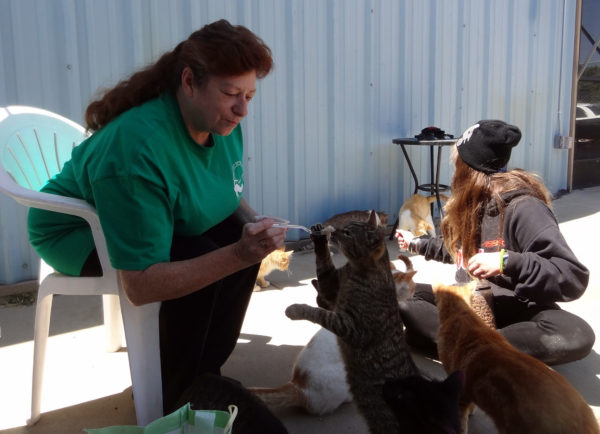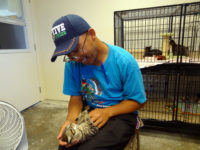 Once in a while, we come across a kitten or cat that is either born in an outdoor colony or through back luck and unfortunate experiences is just not socialized and therefore hard to adopt out. However, just because a kitten was born outdoors, or a cat has been living in a colony does not mean they are destined to live their lives as community cats.
Once in a while, we come across a kitten or cat that is either born in an outdoor colony or through back luck and unfortunate experiences is just not socialized and therefore hard to adopt out. However, just because a kitten was born outdoors, or a cat has been living in a colony does not mean they are destined to live their lives as community cats.
Here at Town Cats, we often pull cats and kittens from the city shelter. Kittens under 3 months tend to be fairly easy to socialize. Older cats display interest in people but are shy or nervous. Often, they appear feral, but generally we find out that they just need a little love, a little patience and some time to adjust to their new surroundings indoors.
Tips for getting started with socializing feral cats and kittens:
 Remember that cats and kittens are very sensitive to their surroundings and contrary to popular belief, they don’t adjust well to sudden changes. So take it slow, minimal sudden movements, speak softly and give them time.
Remember that cats and kittens are very sensitive to their surroundings and contrary to popular belief, they don’t adjust well to sudden changes. So take it slow, minimal sudden movements, speak softly and give them time.- Hissing and spitting is a natural defense mechanism for all cats; it really just says, “I’m really scared and I’m trying to make myself scary so you will go away!”
- It is normal for cats and kittens to hiss when they go from a familiar colony outdoors into a busy, noisy city shelter that is boiling with the scent of hundreds of other animals. It is quite unnerving to say the least.
 It is best to put a scared cat or kitten in a cat condo or in a small room like a bathroom, let them get used to their new surroundings before you attempt to pick them up—remember this is an action that they are not familiar with and they certainly don’t know you are not going to hurt them.
It is best to put a scared cat or kitten in a cat condo or in a small room like a bathroom, let them get used to their new surroundings before you attempt to pick them up—remember this is an action that they are not familiar with and they certainly don’t know you are not going to hurt them.- Observe them to determine what they are comfortable with. A feather toy can tell you if he is comfortable being touched, and if he is not, this is where it starts. A fun activity for kitty is also a learning opportunity for both of you.
- Save the yummiest food or treats for times when you are present. Cats will start to connect that scrumptious wet food with the human that brings it—eventually learning that humans are actually OK! Soon, he will start looking for you and expecting more good things to happen when you are around.
- Wait for kitty to make contact and when he does, start petting the top of head and work your way back to the ears and under his chin, eventually he will let you pet his back. When he plops down on the floor for belly rubs, you know you have hit the jackpot! Even still, take it slow and gentle until you have earned his trust.
Many rescue volunteers find this experience one of life’s most rewarding challenges. To help a cat or kitten learn the ways around humans and helping them learn to trust people can be elating! When a scared kitty comes willingly and delivers a head-butt greeting, it is enough to make anyone’s heart skip a beat.
At Town Cats, we are always in need of people who are willing to foster our shy and scared kitties. People who understand what it may be like for a cat to be so scared and confused that it makes them curl up in a corner. People who are willing to wait and work with these babies to help them overcome their anxiety and set them on the road to a happy life indoors.
If you think you have what it takes and are willing to help these cats and kittens, please contact us immediately to get started today!
Thank you from the bottom of our hissy-hearts!
Read more on socializing cats and kittens at:
AlleyCat.org: Socialized Cat Guide
